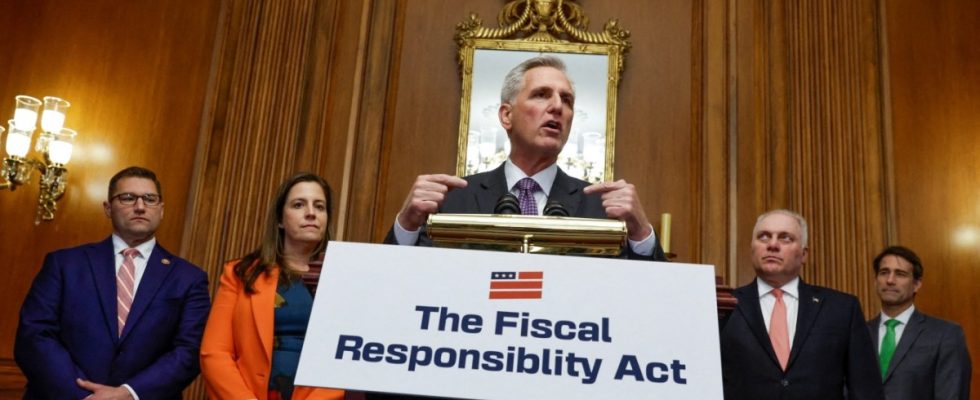On Wednesday evening shortly before half past nine in Washington, DC, the global economic crisis was averted for the time being, and in the end the drama was even limited. For weeks, Democrats and Republicans had been arguing about the US debt limit, without an agreement, according to Treasury Secretary Janet Yellen, the US would no longer be able to pay its bills from June 5th. There was another heated debate in the House of Representatives, but then the vote went well: 314 MPs voted in favor of suspending the debt limit for an initial period of two years, and 117 against.
149 Republicans and 165 Democrats said yes, 71 Republicans and 46 Democrats said no. That was clearly enough to protect the country and the international markets from what could have been a very uncomfortable turbulence. The Senate has to follow suit on Thursday, but there shouldn’t be any major problems there because, unlike the Republican-dominated parliament, the Democrats still have the majority in this chamber. Joe Biden’s party will hardly want to risk national bankruptcy, but the right-wing part of the opposition was not so sure at the time.
After the vote, which was gratifying for him, the President reported from Colorado, where he is currently on business. Biden recently cut short a trip to Asia and Oceania to find a deal with Kevin McCarthy, Speaker of the House and Chief Negotiator for the Republicans. The House of Representatives has taken a critical step “to prevent the first default and to protect our country’s hard-earned and historic economic recovery,” Biden said. It was “a cross-party compromise. Neither side got everything they wanted. That’s the responsibility of government.”
He also thanked Speaker McCarthy and his team “for negotiating in good faith,” although Biden was initially unaware of this debt limit wanted to negotiate. Biden and McCarthy only presented their agreement at the weekend. Broadly speaking, the government had to promise to temporarily cut spending by several billion dollars and the deficit by $1.4 trillion in ten years. In return, the other side allows the current liabilities to be increased by 2025 in such a way that the world’s largest economy remains liquid.
Debt ceiling negotiations are actually routine in the US
The US is currently allowed to borrow $31.4 trillion, but according to Treasurer Yellen, this $31,400,000,000,000 would no longer be enough from next Monday. For months she has been warning of the consequences of a technical bankruptcy the likes of which the United States has never seen before. Biden also recently pointed out that millions of jobs would be lost if there was no solution. Although his Democrats could easily have accelerated, they were in the majority in both houses until the US midterm elections last November.
With Republicans now ruling the House of Representatives, an American routine this time turned into a risky duel at the cliff. Since 1960 alone, this self-imposed debt ceiling since 1917 has been revised upwards 78 times, 49 times under a Republican president and 29 times under a Democratic president.
In 2011 there was a showdown between Barack Obama and the Republicans, and a way out was found literally at the last minute. The rating agency S&P then downgraded the US from AAA to AA+. In 2013 there was a 16-day shutdown before the adversaries came to an understanding. Even during Donald Trump’s era, the US debt continued to diligently mount, by more than $7.8 trillion – half of it in his last ten months in the White House when the pandemic began, even as Trump and his admirers reluctant to recall this statistic.
Now Trump pretended to be a default, i.e. a bankruptcy, to cope with if the Democrats would not give in properly. It could be bad or not, he said recently. “Maybe it’s a bad week or a bad day – who knows?” His hardliners among the elected officials threatened rebellion if the Biden administration did not cut its budget more aggressively. More Democrats than Republicans voted for this “historic conservative victory,” Democrat Elijah Crane tweeted. “What a joke.”
No camp is enthusiastic, but Biden and McCarthy still feel like winners
For McCarthy, the bad mood in his group was and is tricky because he was only elected as speaker in January after 15 rounds and has to fear for his job at any time. It took some effort to get enough of his people in line. For the circus ring, he once again railed against Biden’s budget policy, spoke of “spending addiction” and that the debt was unsustainable and dangerous. The bill won’t stop that. “But for the first time we’re starting to turn the ship around. This shouldn’t be the last time.”
McCarthy showed the picture of a baby, each newborn in the United States is $ 95,000 in debt. A colleague presented the picture of a tanker who had to turn around – with Trump none of them came along with tankers or babies or, like MP Garret Graves, with the hint that we had “reached our credit card limit as a nation”.
Left-wing Democrats, on the other hand, are angry, among other things, that no taxes are being raised for the rich and corporations, instead savings are being made on tax officials. The agreement does not inspire enthusiasm in any camp, but Biden and McCarthy both feel like winners. “Despite the hostage situation you have unnecessarily plunged the country into, the president understands that we have an obligation, a responsibility, to avoid a catastrophic default,” House Minority Leader Hakeem Jeffries told Republicans. “That’s exactly what President Biden and the Democrats have achieved.”

